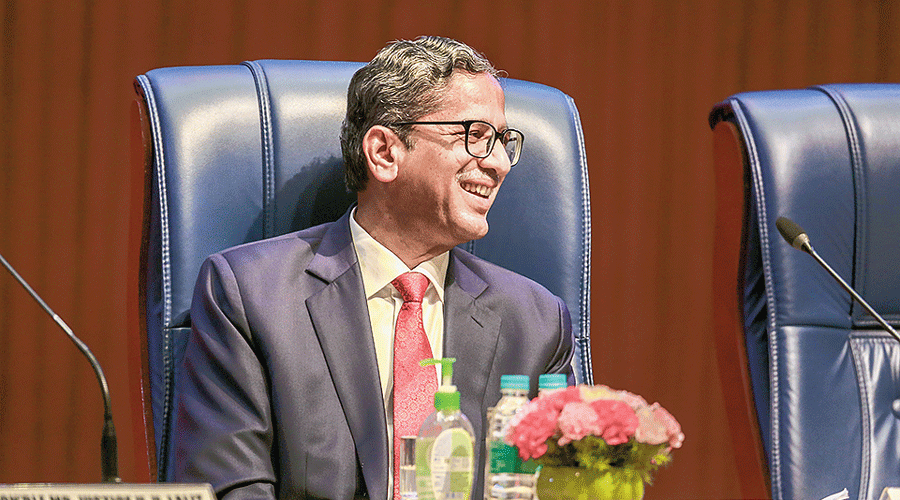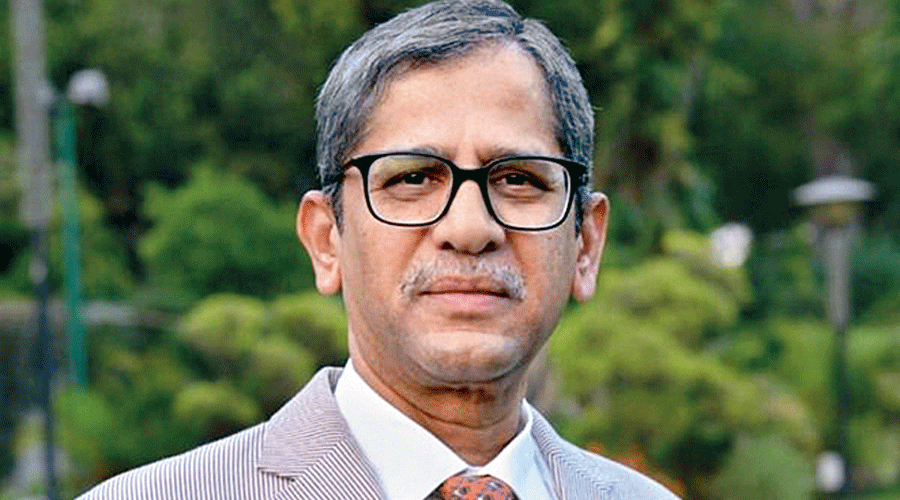Dushyant Dave, senior advocate and a virulent critic of the judiciary when he concludes that it is straying from its path, sobbed and broke down in the Supreme Court on Friday while delivering the ceremonial farewell speech for Chief Justice of India N.V. Ramana.
The display of emotion on the last day marked a turnaround: on April 24 last year, when Justice Ramana took charge as the Chief Justice of India, Dave said, he had penned an article in a national daily saying “everything was lost”.
On Friday, Dave paid glowing encomiums to Justice Ramana and regretted his decision for taking a pessimistic view.
Coming as it did from Dave, known for his forthright, vocal and devastating broadsides against judges and politicians, the packed court was both shocked and bemused.
The doyen of the Bar had to be repeatedly comforted by other lawyers. “Your Lordship has been a citizens’ judge. I cannot hold back my emotions today. You performed the duty with spine,” Dave said.
While some of the earlier Chief Justices had drawn flak for allegations that ranged from sexual harassment to selective listing of cases to indulging the Narendra Modi government, Justice Ramana did steer clear of such controversies and allegations during his 16-month tenure.
Justice Ramana received accolades for his bold approach to several issues in spite of an unseemly attempt in Andhra Pradesh to short-circuit his appointment. A letter was sent to the then Chief Justice by a political chum of the Modi government, casting aspersions on the family of Justice Ramana. But the attempt to sabotage the appointment did not succeed and eventually, his family members were given a clean chit.
However, on some landmark questions, Justice Ramana was unable to ensure closure before his tenure was over.
Those close to Justice Ramana point out that he could not be faulted because during his 16-month tenure, the apex court could hold in-person hearings only on 55 days on account of the Covid-19 pandemic. This apart, nearly 40 per cent of the judges had tested positive for Covid.
The following are some of the unfinished tasks of Justice Ramana and the issues on which he made headway.
Unfinished
⚫ Failed to constitute a constitution bench to deal with the controversial sedition law that was being used increasingly by parties in power against political opponents. But Justice Ramana did impose a stay on invoking the sedition law.
⚫ Justice Ramana did not reconstitute a five-judge constitution bench for dealing with the abrogation of the provision in Article 370 that granted special status to Jammu and Kashmir. He had said a bench would be considered after July but it did not materialise till his retirement.
⚫ The row on the right of Muslim women to wear hijab or that of women of other communities to wear their traditional headgears has also not been dealt with during Justice Ramana’s tenure.
⚫ On a number of occasions, a plea for dealing with the dispute on the opaque electoral bonds was made. But the issue did not get any priority during Justice Ramana’s tenure.
⚫ A decision on the Citizenship Amendment Act, which ignited sustained protests in the country, also remains unresolved.
⚫ The bail plea of journalist Siddique Kappan, in custody since October 2020, was scheduled for listing on Friday. The case did not come up because of the Chief Justice’s farewell and is expected to be heard next week.
However, ignoring fierce opposition from the Yogi Adityanath government in Uttar Pradesh, Justice Ramana granted bail to Kappan, held under the stringent UAPA, for five days to visit his ailing mother.
Headway
⚫ Appointment of a record number of 11 judges to the Supreme Court and 224 judges to the high courts, the elevation of 15 judges to the high courts and the appointment of 100-odd members to quasi-judicial tribunals.
⚫ Brushed aside stiff opposition from the Centre and entertained a batch of petitions seeking a probe into the Pegasus snooping allegations.
⚫ Heading a three-judge bench, Justice Ramana ordered the cancellation of the bail granted to Ashis Mishra, son of Union minister Ajay Mishra, in the farmer murders in Uttar Pradesh’s Lakhimpur Kheri. The bench set aside the bail granted by Allahabad High Court.
⚫ Issued notice to the Centre and the Gujarat government on the controversial release of 11 convicted rapists and murderers in the Bilkis Bano riots case.
⚫ Justice Ramana headed a bench that agreed to revisit certain controversial provisions of the Prevention of Money Laundering Act. The Enforcement Directorate has been accused of using the provisions to harass political opponents of the Modi government.
On Friday, in his farewell speech, Dave told Justice Ramana: “You upheld the rights, Your Lordship upheld the Constitution. You maintained a system of checks and balances.… You left for this country amazing constitutional ethos.
“I genuinely felt it when I wrote that article in The Indian Express the day you took over that ‘everything was lost’. I was sceptical. I may be very pessimistic but Your Lordship has exceeded our expectations. You did what was really expected to be done of this court,” Dave concluded, unable to control his tears.
Senior advocate Kapil Sibal said the judiciary would remember Justice Ramana for maintaining a perfect balance at a time the country was passing through turbulent times.
Sibal added that during his 50-year stint in the Bar, he had come across several Chief Justices but none could match his expectations as Justice Ramana had done.
“When the sea is carved, the ship is stalled. But we are going through turbulent times. It is difficult for the ship to sail. It is there that this court will remember you. Even in turbulent times, you have ensured that the dignity and integrity of the court are maintained. The government is called to answer. The vision of the nation is kept in mind in the course of your judicial determinations,” Sibal said.
The outgoing Chief Justice was outspoken outside the court. For instance, at a national conference, in the presence of Prime Minister Modi, Justice Ramana castigated the government for the whopping 4 crore pending cases in the country, saying some of them could have been avoided had police not indulged in “illegal arrests” of citizens, and authorities did not defy judicial pronouncements.
At another forum, he pointed out that the space for the Opposition parties was fast disappearing in the country, which he felt did not augur well for Indian democracy. He had expressed concern over the manner in which several crucial bills were being passed in Parliament without proper discussions.
Senior advocate Indira Jaising, in a column in her legal portal The Leaflet, summed up: “Chief Justice N.V. Ramana belonged to a rare species of judges who did what they wanted to do without irritating the executive. He will perhaps be remembered more for his speeches outside the court than any judgments delivered in court.”












